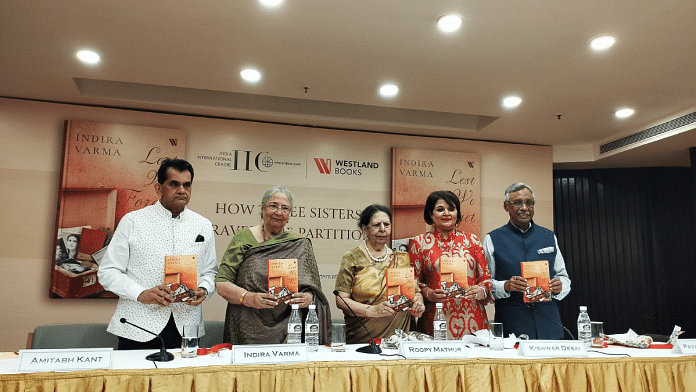New Delhi: The blood-soaked birth of India and Pakistan never goes out of discussion in India’s literary circles. Twenty-five years after Urvashi Butalia gave voice to women, children, and Dalits in her book, The Other Side of Silence, another writer is exploring a new side of the Partition story—a sisterhood of travelling Partition migrants.
Dressed in a purple and green Banarasi sari with Urdu poetry wrapping its folds and pleats, 83-year-old Indira Varma captured everyone’s attention at the book launch in Delhi where she spoke about her memoir, Lest We Forget.
Her recollection of Partition doesn’t mention bloodshed, rapes, and murders, though. It is about life amid the political and social upheavals in 1947.
“I have written about sorrow, troubles, happiness of three women, sisterhood, and their success. It is very personal,” said Varma.
It’s her personal account of how she and her two sisters along with her maternal grandparents and mother rebuilt their lives after fleeing Peshawar.
Like Butalia, Varma wants to reshape the way history has been structured and preserved. For much of history, men have dominated this process, she says. And this has affected the historical memory of Partition.
“This book is very important from a feminist point of view. There are very few books written by women on partition. Whatever has been written is fiction but my book is nonfiction and is a first-hand experience,” said Varma.
Her younger sister, Rupi, attended the book launch with India’s G20 Sherpa Amitabh Kant, diplomat and politician Pavan Kumar Varma and Kishwar Desai, author of Witness the Night, and chairperson of The Arts and Cultural Heritage Trust which established the Partition museum in Punjab.
The panelists spoke about the traumatic events that transpired during Partition and how migrants came to terms with them. In that context, Varma and her sisters stand as exemplary figures who endured it all.
Lest We Forget is an exercise in courage and compassion.
“I cannot sum up my life in 10 minutes, I will be 83 in the next five days. I feel I have lived many lives in these eight decades, Migration, disorientation, and the deaths of my family before they died physically,” said Varma.
A story of three sisters
As catastrophic and traumatic as Partition was, it also saw the power of individual grit and hope. We have records of how displaced families rehabilitated themselves, started over and built new lives from scratch while confronting the horrors of communal violence. And Varma has created something to preserve those memories, said Pawan Kumar.
“What Indira ji has written is an essential chronicle. This is a story about three sisters who may have felt defeated at times but never lost their resilience,” he added.
Varma and her family fled their magnificent home, horses, and all the trappings of luxury in Peshawar in 1947. In India, they lived nothing short of a nomadic life. Homeless and penniless in Nainital, they briefly moved to Delhi where they lived in a Resettlement Commission-allocated house. Then they moved to Kanpur in the 1950s, where they remained for a decade before shifting to Aligarh, Dehradun, and finally back to Delhi.
Their fall from being Peshawar’s elite to paupers in India made them resentful, Varma recalled. In Kanpur, the six-member family was packed into a 10×10-feet room. Today, they have restored their family’s name and regained their place among India’s elite, Varma said. As she recalled her journey from destitution to prosperity, Varma became very emotional. Holding Rupi’s hand, she described how her sister’s employment with an airline transformed their family’s financial condition.
Kant pointed out that what makes this achievement even more remarkable is that Varma penned her memoir at 83 — the passage of time has brought with it a deep cultural knowledge and the ability to weave narrative across generations.
“These are very personal stories that need to be told,” said Kant.
‘A museum in itself’
Memoirs are important literary accounts, especially for women because their stories get lost under the grand narrative of history and historical amnesia. “We do not want [to reopen] the wound of Partition, but we should remember the pain,” he said.
Varma and Desai, too, share the same opinion. “This is another great contribution that this book has made to the overall literature on Partition—and that is because it is a biography. It’s also remarkable from a child’s perspective, which is very unusual,” Desai said.
As part of archiving personal histories, Varma announced that she would be donating her mother’s sari and her father’s Ottoman Empire coins to the Partition museum in Amritsar.
Verma says it is almost like she underwent two separate births — the physical one in Peshawar and a rebirth in India. And Lest We Forget is a repository of this experience.
“This book is a museum in itself,” an attendee at the launch, who was waiting for Varma to sign her copy, told ThePrint.
(Edited by Humra Laeeq)



